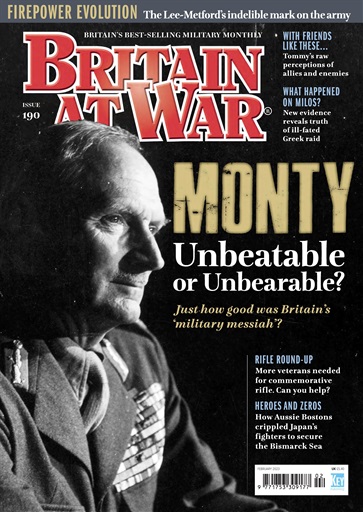The article is about Field Marshal Montgomery, a general in the British Army of the Second World War. More specifically, my side of the article is a “for” argument as part of a joint piece with Dr Timothy Bowman- with him providing the “against”. Montgomery (or Monty) is acontentious character both in the military and political realms; my job was to rebuke criticism of him and put forward a coherent argument that he was a “great commander”
Why did you choose to write about Field Marshal Montgomery in particular?
My choice to write about Monty was partly by chance based on coursework I had done as part of my second year module: “Churchill’s Army: the British Army in the Second World War”. I had chosen to answer a question regarding Monty’s performance as head of the British Army in Northwest Europe in 1944. I found the topic full of controversy and enjoyed redeeming, in a small way, the reputation of the British Army of this period. Repeated accusations from historians that Monty was too slow, too cautious and too reliant on firepower struck me as strange considering the reality that the allied forces were fighting to end Nazism. This became more pertinent when I read John Buckley’s work Monty’s Men. Buckley demonstrated that the British Army of the time was made up largely of inexperienced civilians and that Britain had hit a manpower ceiling. Monty’s leadership of the last army Britain could field was undoubtedly inspiring; but I also found it greatly rewarding writing about his personality. This allowed a balanced assessment of his character and revealed the truth that he was a completely flawed, imperfect person, as all great commanders are.
How did you get involved with the ‘Britain at War’ magazine?
My involvement with the Britain at War magazine is entirely due to the faith that Dr Bowman had in my original essay. Without his tutelage and constructive assessment of my work it wouldn’t have been possible. It is of great credit to him and the department that they trust second year students with such opportunities and are willing to take time out to ensure that the support is there when needed.
What skills will you take away from this experience?
I will take any number of skills from this experience. I think the most important one may be the adjustment from formal academic writing in undergraduate essays to the more digestible form of writing that appeals to a larger audience. For example, instead of diving deep into statistics or historian’s arguments, the commuter who has nipped into WHSmiths probably wants a broad summary. Moreover, the average consumer wants more excitement than the formality of an undergraduate essay permits. Broadening my approach to writing is always a good thing and shall certainly serve me well in the future.
What do you enjoy most about studying History?
The thing I enjoy most about the study of history is that the field is constantly shifting and allowing people to understand historical events in completely novel ways. The stories of the heroic landings of D-Day or the defeat of the Axis forces in North Africa have been told time and time again. However, the interesting thing is how we approach these stories, and how these approaches morph over time. By being tenaciously curious and seeing evidence from as many different viewpoints as possible, the student of history gains a deep and invaluable understanding of humanity.
What made you choose your course at Kent?
My choice to study at Kent was largely due to the clear advertisement of the modules that were available to study! When I decided to start university I already had an idea where my passion would lie academically and it was clear by the courses available at Kent that I would enjoy the subject. Crucial to this was knowing what I could be studying in third year before I made the commitment to start. Alongside the fact that the course catered to my own interests, I found the History department absolutely full of staff members that have a genuine care for their students. It is always assuring knowing that the people tutoring you really want you to succeed and have your best interest at the core of what they do. This has been affirmed throughout my time at Kent; from the small things like essay feedback or the lending of a book to the larger things such as being put forward to publish an article.
What advice would you give to others who are interested in getting their work published?
I would consider myself very lucky to have my work published, but the harder you work the more luck you tend to have. I have always thought that the department does a great job in giving opportunities to those that have worked hard for them.
Are you currently working on any interesting projects that you would like to tell us a bit more about?
I am currently taking part in a very interesting project led by Kent’s Dr Mario Draper. He is leading a simulated war game called “1918: a Storm in the West”. There are so many students taking part and we are all really enjoying it. It is great to simulate the pressures put on commanders to make high-level strategic decisions encompassing political, economic and military considerations. A better understanding of the decision making in war is great for building on the education we are receiving as part of our respective courses.

